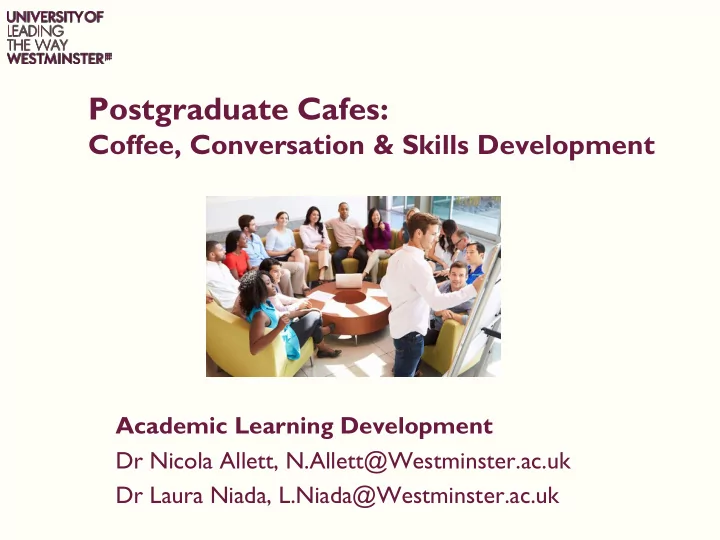

Postgraduate Cafes: Coffee, Conversation & Skills Development Academic Learning Development Dr Nicola Allett, N.Allett@Westminster.ac.uk Dr Laura Niada, L.Niada@Westminster.ac.uk
Outline 1. Rationale for Postgraduate Cafes 2. The Postgraduate café pilot 3. Implementation 4. Evaluation 5. Conclusions 6. Discussion point
Who we are – Academic Learning Development helps students develop their academic writing and learning strategies – Open to all students – Services: – Academic skills workshops – Academic skills appointments
Rationale of PG Cafes – ‘ALD end of year student survey’ and workshop feedback forms - asking for distinct sessions for PG students – Observation that PG students tend to bond with each other at our workshops – Universities using more informal modes of delivery (such as ‘writing cafes’ and ‘research cafes’ at DeMontfort and Warwick) – PG students and inclusivity: • Demand for advanced academic skills • Many are foreign students • Many are mature students
International students – International students tend to be used to different learning and assessment methods (Carroll 2008; Caruana and Spurling 2007) – Sometimes feeling isolated, “homesick” – UoW named the most internationally diverse university in the Hotcourses Diversity Index (HDI). • 169 nationalities • 8,429 international students.
Mature students – Mature students tend to have other commitments e.g. family and/or professional life – Sometimes deficient in study skills and background preparation – Sometimes finding it difficult to bond with other students (Fragoso et al 2013)
The Postgraduate Café Pilot – ALD Learning Adviser facilitated an informal workshop on an academic skill area. – Students were encouraged to engage in discussion and activities related to the topic, share experiences, compare learning strategies and give tips. – Students completed an anonymous evaluation form at the end of each session and were invited to fill a final survey on the project.
Implementation of PG Cafes – PG Cafes took place every fortnight, at lunchtime (10 sessions) – Idea of comfortable environment facilitating interaction, sharing of tips, peer learning and support, networking – Supply of coffee and biscuits – Learning Futures rooms facilitating group work (Regent campus in Semester 1 and Cavendish campus in Semester 2) – Facebook group – Booking via engage
Postgraduate Café Topics Ten topics identified using information about PG student queries and specific support requested. Time organisation Essay planning Organising research Structuring work Generating writing Report writing Developing dissertation topic Time management for dissertations Critical writing Writing style and proof reading
Attendance Total attendance: 82 (individual students = 50) Facebook group: 17 members UG Session attendance ranged from 5- 4% 17 students PGR 20% Not everyone was a PG student! PGT 76%
Attendance FACULTY NATIONALITY WSMAD 11% FABE UK 25% 26% WBS 9% Non-EU 51% FST 8% EU 23% SSHL 47%
Results: Session feedback 99% of students rated the sessions ‘good’ or ‘excellent’ “it was good sharing worries and solutions with other students” “it felt like a safe space to express myself” “these sessions are great to calm my anxiety about the daunting task ahead” “exchanging thoughts, ideas with workshop leader and the other students and sharing experiences and solutions was helpful”
Some issues… – Finding a date / time that would suit students (and room booking) – Started with Wednesdays lunchtime - students asked it to be moved to Thursday lunchtime – Feedback highlighted that students wanted longer sessions = Changed from 1 hour to 1.5 hour – Basic level skills – Planned little ALD Adviser role in presenting information, but some feedback highlighted need for more comprehensive academic skills workshops.
Final Survey Final survey (9 respondents): – 100% rated PG Cafes useful – 100% declared their confidence increased – 100% declared PG Cafes helped them improve their marks – Asked why participated: • 100% to get academic skills support dedicated to PG level • 33% to meet other PGs • 11% coffee and biscuits!
Conclusions – Pilot generally positive – Plan for initiative to be repeated (semester 2 of 2017-2018) – PG students valued PG level session – PG students valued informal space to share experience and get peer support
Audience Question: – How could postgraduate peer support be utilised within your courses/faculties?
References Carroll, J. (2008). Assessment Issues for International Students and for Teachers of International – Students. The Higher Education Academy. Available from https://www.heacademy.ac.uk/system/files/carroll.pdf [Accessed 31 August 2016]. Caruana, V. & Spurling, N. (2007). Internationalisation of UK Higher Education: A Review of – Selected Material. Available at https://www.sussex.ac.uk/webteam/gateway/file.php?name=lit- review-internationalisation-of-uk-he-v2&site=44 [last accessed 31 August 2016]. Fragoso, A., Goncalves, T., Ribeiro, C., Monteiro, R., Quintas, H., Bago, J., Fonseca, H., and Santos, – L. (2013). The transition of mature students to higher education: Challenging traditional concepts? Studies In The Education Of Adults , 45(1), 67-81 University of Westminster (2016). Top 10 Highlights from the University of Westminster in 2016. – University of Westminster. Available from https://www.westminster.ac.uk/news-and- events/news/2016/top-10-highlights-from-the-university-of-westminster-in-2016 [Accessed 26 April 2017]
Contact Email: – Nicola Allett: N.Allett@Westminster.ac.uk – Laura Niada: L.Niada@Westminster.ac.uk Web page: https://www.westminster.ac.uk/Academic-Learning-Development https://engage.westminster.ac.uk/ALD University of Westminster Learning Support @UWstudyskills
Recommend
More recommend